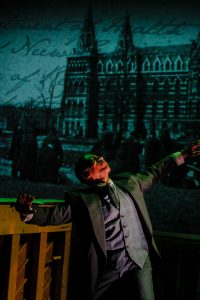Fleming’s ‘Joplin:’ Impressions of Genius
Composer Scott Joplin made ragtime, a style of piano-playing in honky-tonk joints, respectable. He wrote not only a variety of pieces for the piano but also two operas and a ballet. He lived in relative obscurity, however, and it would take academic musicologists fifty years after his death in 1917 to bring his music to popular attention.
Robert Barry Fleming, a distinguished actor, writer, and director who splits his time between heading the theatre and performance studies program at the University of San Diego and serving as Director of Artistic Programming at Arena Stage in Washington, D. C., has compiled an impressionistic solo portrait of Scott Joplin. Its impressive world premiere production, by Mo’olelo Performing Arts Company, is currently playing through October 12 at the Tenth Avenue Arts Center Mainstage.
Mr. Fleming’s performance almost immediately announces that we are not in Hershey-Felder-land, for he eschews the style that Mr. Felder has pioneered in presentations such as George Gershwin Alone or the current San Diego REP presentation (also through October 12, which makes it easy to compare the two) of The Pianist of Willesden Lane. Joplin is only to a small extent a biography; rather, Mr. Fleming wants to position his subject as part of a turn-of-the 20th Century movement toward a black consciousness that helped to define African Americans as valued contributors to social and cultural life in the U. S.
Not that any of this was easy. There was substantial public intellectual disagreement that occurred between Booker T. Washington (whom Joplin admired) and W. E. B. Du Bois about appropriate paths to equality. According to Mr. Fleming, Joplin observed this debate from afar if at all and only took a stance (preferring to refer to himself as “Afro American” instead of “Colored” or “Negro”) after being prodded by his ill-fated second wife, Freddie Alexander.
And, life was never easy for early African American artists, such as Mr. Joplin. There were disputes with publishers, thefts of manuscripts, and appropriations of songs (as Mr. Fleming points out, Irving Berlin examined one of Joplin’s works while working for a publisher and then took a melody from it as the basis for his hit, “Alexander’s Ragtime Band”).
 Aided by director George Yé, scenic designer David F. Weiner, sound designer Joe Huppert, costume designer Jeannie Galioto, lighting designer Jason Bieber, and properties designer Tim Nottage, Mr. Fleming’s 75-minute performance has a lot of moving parts. There are lighting changes and sound cues that have to be inserted with precision, and there are quite a few projections that are crucial to understanding Mr. Fleming’s point that Joplin’s contribution to African American music reaches far beyond the details of his life.
Aided by director George Yé, scenic designer David F. Weiner, sound designer Joe Huppert, costume designer Jeannie Galioto, lighting designer Jason Bieber, and properties designer Tim Nottage, Mr. Fleming’s 75-minute performance has a lot of moving parts. There are lighting changes and sound cues that have to be inserted with precision, and there are quite a few projections that are crucial to understanding Mr. Fleming’s point that Joplin’s contribution to African American music reaches far beyond the details of his life.
And, in fact, if you’re interested in the music you’ll only be teased. Joplin was not known for being more than a mediocre pianist, and Mr. Fleming replicates what a Joplin version of his own music might have sounded like. If your curiosity is piqued, however, you’d do well to listen to the landmark recordings of Joplin’s music by Joshua Rifkin, the New England Ragtime Conservatory, or one of several recordings of his surviving opera, Treemonisha.
Maybe piqued is a good word to describe Mr. Fleming’s work. The various impressions that Mr. Fleming and his creative team have compiled and assembled both proved to be intellectually engaging and spurred me to learn more about this fascinating and somewhat enigmatic musical genius.
[box]Performs September 27, October 2, 3, 4, 9, 10, 11 at 8 PM, and September 28, October 5, 12 at 2:00 PM at 930 10th Ave, San Diego, CA 92101. Street parking is available at no charge after 6pm and all day Sunday. Tickets are $32 with some discounts available. This review was based on the opening night performance, September 26.
DOWNLOAD CAST AND CREDITS HERE [/box]

In addition to reviewing theatre for San Diego Story, Bill also reviews for TalkinBroadway.com. He is a member of the San Diego Theatre Critics Circle and the American Theatre Critics Association. Bill is an emeritus professor in the School of Journalism and Media Studies at San Diego State University.



